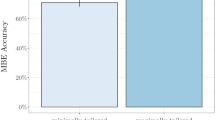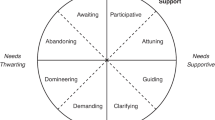Abstract
Two experiments investigated baseline reviews as a relevant variable in reorganization of equivalence classes. After formation of three 4-member classes, participants learned reversals of baseline conditional discriminations and expanded the classes to 5 members each. In Experiment 1, 4 studl3nts responded on equivalence probes without baseline reviews preceding each test. They seldom reorganized classes consistently with reversed baselines. Their performance was sometimes consistent with the original baseline and sometimes inconsistent with both baselines. In Experiment 2, 4 additional students received the same training and tests, with baseline reviews preceding each test. These participants always reorganized classes consistently with the reversed baselines. Baseline reviews may have functioned as contextual cues, strengthening the most recent baseline against the conflicting earlier ones.
Similar content being viewed by others
bl]References
CARRIGAN, P. F., & SIDMAN, M. (1992). Conditional discrimination and equivalence relations: A theoretical analysis of control by negative stimuli. Journal of the Experimental Analysis of Behavior, 58, 183–204.
De ROSE, J. C. (1996). Controlling factors in conditional discriminations and tests of equivalence. In T. R. Zenctall & P. M. Smeets (Eds.), Stimulus class formation in humans and animals (pp. 253–277). Amsterdam: North Holland.
DUBE, W. V., & HIRIS, J. (1997). Match to Sample Program (version 11.1.3) [Computer software]. Waltham, MA: E. K. Shriver Center for Mental Retardation.
DUBE, W. V., & MCILVANE, W. J. (1996). Some implications of a stimulus control topography analysis for emergent behavior and stimulus classes. In T. R. Zentall & P. M. Smeets (Eds.), Stimulus class formation in humans and animals (pp. 197–218). Amsterdam: North Holland.
GAROTTI, M. F., De SOUZA, D. G., De ROSE, J. C., MOLINA, R. C., & GIL, M. S. A. (2000). Reorganization of equivalence classes after reversal of baseline relations. The Psychological Record, 50, 35–48.
PILGRIM, C., CHAMBERS, L., & GALIZIO, M. (1995). Reversal of baseline relations and stimulus equivalence: Children. Journal of the Experimental Analysis of Behavior, 63, 239–254.
PILGRIM, C., & GALIZIO, M. (1990). Relations between baseline contingencies and equivalence probe performances. Journal of the Experimental Analysis of Behavior, 54, 213–224.
PILGRIM, C., & GALIZIO, M. (1995). Reversal of baseline relations and stimulus equivalence: Adults. Journal of the Experimental Analysis of Behavior, 63, 225–238.
REHFELDT, R. A., & DYMOND, S. (2005). The effects of test order and nodal distance on the emergence and stability of derived discriminative stimulus functions. The Psychological Record, 55, 179–196.
REHFELDT, R. A., & HAYES, L. J. (2000). The long-term retention of generalized equivalence classes. The Psychological Record, 50, 405–428.
SAUNDERS, R. R., SAUNDERS, K. J., KIRBY, K. C., & SPRADLIN, J. E. (1988). The merger and development of equivalence classes by unreinforced conditional selection of stimuli. Journal of the Experimental Analysis of Behavior, 50, 145–162.
SAUNDERS, R. R., WACHTER, J., & SPRADLIN, J. E. (1988). Establishing auditory stimulus control over an eight-member equivalence class via conditional discrimination procedures. Journal of the Experimental Analysis of Behavior, 49, 95–115.
SIDMAN, M. (1987). Two choices are not enough. Behavior Analysis, 22, 11–18.
SIDMAN, M. (1994). Equivalence relations and behavior: A research story. Boston, MA: Authors Cooperative.
SIDMAN, M., & TAILBY, W. (1982). Conditional discrimination vs. matching to sample: An expansion of the testing paradigm. Journal of the Experimental Analysis of Behavior, 37, 5–22.
SMEETS, P. E., BARNES-HOLMES, Y., AKPINAR, D., & BARNES-HOLMES, D. (2003). Reversal of equivalence relations. The Psychological Record, 53, 91–119.
SPRADLIN, J. E., SAUNDERS, K. J., & SAUNDERS, R. R. (1992). The stability of equivalence classes. In S. C. Hayes & L. J. Hayes (Eds.), Understanding verbal relations (pp. 29–42). Reno, NV: Context Press.
WILSON, K. G., & HAYES, S. C. (1996). Resurgence of derived stimulus relations. Journal of the Experimental Analysis of Behavior, 66, 267–281.
WIRTH, O., & CHASE, P. N. (2002). Stability of functional equivalence and stimulus equivalence: Effects of baseline reversals. Journal of the Experimental Analysis of Behavior, 77, 29–47.
Author information
Authors and Affiliations
Corresponding author
Additional information
This study was based on a dissertation presented by Marilice Garotti to Universidade de Sao Paulo, in partial fulfillment of the requirements for a doctoral degree in Experimental Psychology. The research was supported by MCT/FINEP/PRONEX, and preparation of the manuscript was supported by FAPESP/PRONEX, Grant # 03/09928-4. M. F.
Rights and permissions
About this article
Cite this article
Garotti, M., De Rose, J.C. Reorganization of Equivalence Classes: Evidence for Contextual Control by Baseline Reviews Before Probes. Psychol Rec 57, 87–102 (2007). https://doi.org/10.1007/BF03395566
Published:
Issue Date:
DOI: https://doi.org/10.1007/BF03395566




